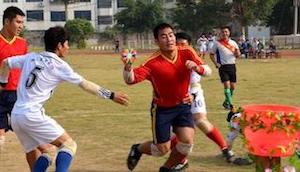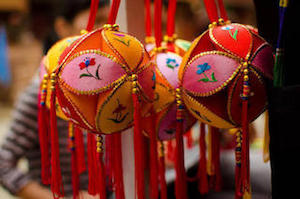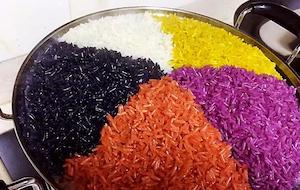When you read the title of this article, you must be wondering, “March 3rd? Is this a special day? Your birthday? Whose birthday is it?” The answer is: “No, I’m talking about a special festival in Guangxi, China.”
The March 3rd Folk Song Festival is a traditional festival for the Zhuang ethnic minority in Guangxi, which dates the third day of the Lunar New Year in China. Its name is: Song Festival. The full name of Guangxi is: Guangxi Zhuang Autonomous Region. Therefore, the song festival is mainly the traditional festival of Guangxi Zhuang. Do you want to know the origin of the festival?
Table of contents
Legends about the Zhuang Folk Song Festival
The song festival, also be called the folk song festival, has many legends.
- According to ancient legends singing can make the gods inspired to happiness, can eliminate disaster, wind and rain smooth. This later developed into the present song festival.
- Another legend tells that once upon a time, there was a young man and a young woman who had been in love since childhood, and they were very good at singing mountain songs and expressed their love with mountain songs. But their parents didn’t agree with their relationship: they couldn’t get married, they couldn’t fall in love. So they died together. Later, in honor of this faithful couple, people gathered each year on the anniversary of their martyrdom to sing mountain songs, and this gradually became the song festival.
- In one of China’s dynasties, there was a song fairy named Liu Sanjie, who used mountain songs to celebrate labor and love, and to expose the evils of certain wealthy people. So the evil rich people hated her very much. When she was cutting wood in the mountains, one such person cut off the rope that supported her, causing Liu Sanjie fell into the valley to die. People commemorated the song fairy, on the 3rd of March every year, singing for three days and three nights, and this became the song festival.
Among them, I listen to the third legend more often. The story of Liu Sanjie is widely circulated among the older generation in Guangxi. On March 3rd, some places will carry out activities, singing mountain songs and dancing national dances to popularize the legends and national culture of Liu Sanjie to young people.
Local customs during the folk song festival
There are some local customs about the festival. For example, grabbing huapao (a woven flower), throwing xiuqiu (embroidered balls), and eating five-color glutinous rice.
Grabbing huapao (woven flowers)
Grabbing huapao: two teams of eight people rush into the other side’s defensive position, put the huapao into the opposing team’s goal, get a point. The rules of the sport are similar to rugby in western countries.
The traditional woven flower, or huapao, is a ring made of iron, about 5 cm in diameter, and the outside is wrapped in a red cloth to form a ball. The venue was traditionally on the banks of the river or on the hillside. Nowadays, the game is played on flat open spaces.

Throwing Xiuqiu (“embroidered balls”)
Throwing Xiuqiu (“embroidered balls”): Xiuqiu is a traditional handicraft with exquisite craftsmanship. It is a silk-woven handicraft. Each xiuqiu consists of twelve petals forming a sphere, each petal represents a certain month and is embroidered with the flowers of that month. Some xiuqiu are square or polygonal. In the past, young men and women used the xiuqiu to express their love. If a girl liked a boy, she would throw her xiuqiu to the boy. The xiuqiu has become a kind of decoration and performance prop. Women in national costumes throw the xiuqiu over their heads and then catch them when they fall.

Five-color glutinous rice
Eating five-color glutinous rice (wuse fan): Whenever the holiday comes, every family will make five-color rice and colorful eggs. The five-color rice is usually dyed with the juice of plants of various colors, turning the rice into red, yellow, black, purple, and white: five colors of rice. Legend has it that after eating this kind of rice, you will be in good health and future generations will be harmonious. Colored eggs are objects used by young men and women to convey emotions.

My family history in Guangxi
The festival is a Zhuang tradition. The Han Chinese do not follow Zhuang customs and celebrate the festival. However, the Han Chinese are also immersed in the atmosphere of the festival. All ethnic groups can be spectators to the wonderful performances.
My grandfather’s family on my mother’s side is Zhuang, so when I was a child we ate five colors of rice with my uncle’s family. That is a time I will never forget. Five-color rice is sweet, soft, and has the fragrance of the plants used to make the colored dyes.
My mother married into a Han family, about 400 kilometers from her hometown. We did not celebrate the festival, we did not dye the rice, but she always used the only color she had, red, to dye boiled eggs. She would give a red, boiled egg to me. My mother would also weave a small, woolen mesh bag, put the eggs in, tie them, and hang them around my neck, like a long necklace. The red eggs were like my rubies. My mother will also give her nearby Zhuang friends a mesh bag with eggs inside, as a way to remember the traditions of home and share the joy of the holiday. Nowadays, colored eggs are no longer only used for young men and women to convey emotions, but have become a symbol of the festival.

Traditionally the Mountain songs were sung in the Zhuang language. Now people also use Mandarin to sing. There are no fixed lyrics, nor a single melody. How you want to sing is up to you, this is your song, you complete the composition and singing. Music is free. As traditional national music, more and more young people have begun to understand and love this festival. At the festival, you can see a lot of young men and women in traditional national costumes, they sing mountain songs, they play traditional games. You will see our variety of ethnic cuisine and beautifully made traditional crafts.
If you come to Guangxi to enjoy the festival, I think you will like it here. This is a region with a traditional national flavor and fraternity. Do you want to sing? Would you like to taste all kinds of food? Do you want to play traditional games with us? So, come on! Guangxi welcomes you!
Do you enjoy My Chinese Home Kitchen?
We enjoy sharing these authentic home recipes with you. To learn more about My Chinese Home Kitchen, please visit our About page.
Please leave a comment, or SUBSCRIBE to our newsletter.
For more of our original videos, visit My Chinese Home Kitchen on YouTube and Rumble.



You can’t translate 三月三 as March 3rd. The month names can only be used with the western calendar. Using them for the traditional Chinese calendar just causes confusion and crazy things like “This year March 3rd is on March 24th.”
It is more correct to call 三月三 the 3rd day of the 3rd lunar month. Longer but clear.
Ken – Liuzhou, Guangxi
Hi Ken,
Glad you found our website.
How long have you been in Liuzhou? Jing grew up not far from there, but was never able to visit Liuzhou until last August.